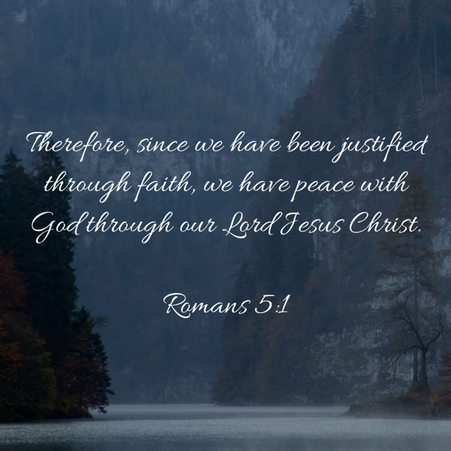|
Good morning!
We are so happy you chose to join us today!
When we meet together in person, we take time to share our joys and concerns. Consider your last week, and any prayer requests you might have. If you would like, you can share prayer requests as a comment on this post. When you are ready, use the prayer below to get started.
Dear Lord, thank you for your forgiveness. Thank you for not abandoning us to our mistakes, but for reaching out instead to bring us home. Help cleanse me of my sin and help me accept your mercy without shame. Thank you for the love you have poured out for me and all of your children. Help me live out of that love today. In Jesus' Name, Amen.
Today's lesson is on John 21:15-19.
This lesson picks up immediately where the previous lesson left off when Jesus cooks breakfast for some of the disciples who were fishing. We note that the focus narrows from the disciples in general to Peter specifically. But keep in mind that as Jesus and Simon Peter speak, they are still in the presence of the others, including John.
The New Testament testifies in various ways to Peter's unique and ongoing role in Jesus' ministry and in the earliest life of the church. Along with Paul, Peter stands out among the apostles in terms of his fame and influence. Peter was one of the three apostles considered by Paul to be “pillars”of the church. Peter emerged early on as a leader, bold in word and deed. He was among the first to recognize that when Jesus told his followers to “go and make disciples of all nations”, he really did mean to go to Gentiles without requiring them to take up Jewish practices before accepting him. In Acts 10 it tells of the vision that Peter had about the unclean food that God had told him to eat. While Peter was wondering about the meaning of this vision, the men sent by Cornelius the Centaurian who had seen an angel who told him to send for Peter to come to Cornelius house. While Peter was there the Holy Spirit came upon all that was there to hear his message just the same as the Holy Spirit had came upon them on Pentecost. Peter's influence resounded throughout the church. The impact of the events of today's text are therefore incalculable . Jesus asked Peter “Do you love me more that these?” Peter had overtly denied Jesus while Jesus was on trial. One explanation for Jesus question is simple redemption. This understanding was widespread in ancient Christian interpretation. Jesus was giving Peter the opportunity to repent of his betrayal and reaffirm his love for and devotion to Jesus. Jesus question as a call for repentance and redemption also refutes the idea that Jesus required affirmation from Peter, as though Jesus did not know Peter loved him or that Jesus was unsure of Peter's loyalty. Dovetailing with the above two explanations is one more concerned with Peter's prominent role in the first century church. Even though all of Jesus' disciples abandoned him with the exception of John, Peter's denial stands out as particularly grievous. Peter had boldly proclaimed that he would not betrayed Jesus even if others did, making his denials stand out . How, then, could Peter become arguably the most influential of the Twelve? How could he, who did not just run but verbally and empathically denied Jesus, become a faithful leader? John's inclusion of the series of questions and answers between Jesus and Peter more than justifies the position that Peter would hold. Though it is possible that Jesus was asking whether Peter loved him more than Peter loved the other disciples or his fishing profession it probably means that Jesus was asking if Peter loved him more than the other disciples did. More than a comparison between the states of their hearts-clearly a task Peter was not qualified to answer- the question was about the depth of Peter's own love. Did Peter's experience deepen his love for Christ or shatter it? If Peter loved Christ more than the others did, would Peter be prepared to do as Jesus would command? We might ask ourselves the same question following sinful failures. Though the word repentance is not used here, Peter's response clearly illustrates it. His response was an important step in repairing his relationship with Jesus. Note that Jesus approached Peter; similarly, Jesus approached us before we even knew him. Romans 5:8. Peter may have felt himself on unsteady footing with Jesus. Jesus question allowed Peter to affirm for himself and his companions the depth of his love and loyalty, despite his prior stumble. Jesus' question to us – whether he will be Lord of our lives, whether we love him-is also an opportunity to repent of whatever sins have prevented us from having the relationship we need with him. Jesus said, “Feed my lambs.” Jesus had identified himself as the good shepherd. In that discourse Jesus contrasted himself with Israel's current spiritual shepherds, who acted more like thieves than caregivers. Jesus' self-disclosure as Israel's shepherd was a claim of rightful leadership in ancient terms and even a fulfillment of God's promises. For example, in Ezekiel 34 God rebuked Israels shepherds; the nation's political religious leadership. As with corrupt leadership the world over, past and present, these authorities were more concerned with their own welfare and even luxury that with the lives of the people they were tasked with serving. God promised to remove those shepherds and take up the job himself. He would seek and find the lost sheep; he would feed them and heal them. Ezekiel 34: 1-16. In Jesus, God has fulfilled his promise. Jesus is the loving shepherd who feeds and protect his flock. He demonstrated this by healing the sick and feeding the multitudes. Jesus taught God's love for the lost sheep and indicated his role in seeking the lost. With Jesus' time on earth rapidly coming to a close, the task of shepherding his flock was still his. But Jesus would ensure that his disciples were empowered to care for the fledgling church- and his work continues today. Jesus has promised he will appear again, but we don't know when this happen. In the meantime, do we wall ourselves off from society and proverbially sit at the window waiting? No. We too have task to fulfill. We are not all called to be apostles or preachers or teachers. But we are all called to good works in Christ and whatever other work we do-as parents and grandparents, as employees or bosses, as citizens in our communities- we do as working for the Lord. Until Jesus returns, we too can make the most time and feed Jesus' sheep. Jesus proceeds to tell Peter about Peter's suffering and death. In light of what lay ahead for Peter, faithfulness to Jesus required a love so great that it could overcome the instinct for self-preservation. Peter loved Jesus he would show this through his own ministry and death. Stretch out your hands is and allusion to carrying one's cross to one's execution. Someone else will dress you and lead you where you do not want to go finishes the contrast. Peter's life would not be his own. In this way, his life parallel that of Jesus.
Conclusion
Peter stands out as a model disciple for a numerous of reasons. First, Peter was not unique in his need for redemption. All of us stand before Jesus needing redemption, being incapable of accomplishing it for ourselves. Just as Jesus did for Peter, so also Jesus does for us. He made the first move toward our redemption long ago on the cross and continues to invites us to accept his sacrifice as the atonement for our own sins. God's grace is magnified by the fact that Jesus himself, the offended party, initiated the process. This is consistent with the biblical story in which God, who is always the offended party, initiates reconciliation with sinful humanity. Second, Peter redemption resulted in commission. Like Peter, we confess our love for our Lord and Savior. Doing so must result in our commitment to living lives that parallel Jesus' own; being more concerned about the will of our Father than with our own agendas. Though how we each live out Jesus' commission varies based on our circumstances, each of us is called to the life of faith. Third, our commission comes with knowledge of what our faithfulness can cost us. Like Peter, we accept the call with the clear understanding that because Christ suffered and we are his, we too expect the life of faith to entail suffering just as Peter's did. Sometimes this means physical suffering or even death at the hands of the world. Sometimes it means enduring shame and torment for righteousness' sake. Fourth, like Peter's pain, our own suffering comes with a promise. With our suffering it comes with a promise. When we suffer for Christ and for godly purposes, we bring glory to the Lord- no matter how humiliating the world might believe our plight to be. None of us today have had an encounter with Christ like Peter did. But when you tell the story of how God has redeemed you, what role do believers like Peter play? In whose redemption story do you (or should you) play a role? Prayer Heavenly Father, thank you for making our redemption story possible. Help us to embrace living lives that parallel Jesus' life and bring glory to you, even in suffering. In Jesus' name we pray. Amen. If you would like to read a good book about Peter, Lois would recommend “Simon Peter, Flawed but Faithful Disciple” by Adam Hamilton. It discuss how most Christians identify with Peter because he did have his flaws like we all do. It had some many insights that you might not of thought of.
Questions
Benediction
Today's benediction is from the New Revised Standard Version.
Next week's lesson will be on Acts 1:1-11.
0 Comments
Leave a Reply. |
AuthorWe are a small, rural Presbyterian church in southwestern Pennsylvania. Archives
July 2024
Categories
All
|



 RSS Feed
RSS Feed